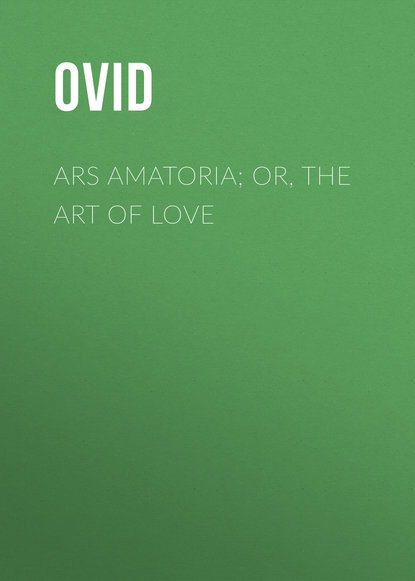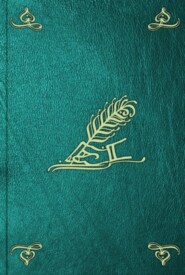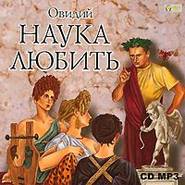По всем вопросам обращайтесь на: info@litportal.ru
(©) 2003-2024.
✖
Ars Amatoria; or, The Art Of Love
Настройки чтения
Размер шрифта
Высота строк
Поля
1089 (return (#x3_x_3_i29))
[ Glowing wheels.—Ver. 396. See the Amores, Book iii. El. ii.]
1090 (return (#x3_x_3_i30))
[ Thamyras.—Ver. 399. He was a Thracian poet, who challenged the Muses to sing, and, according to Homer, was punished with madness. Diodorus Siculus says that he lost his voice, while the Roman poets state that he lost his sight. Amoebeus was a famous lute-player of Athens.]
1091 (return (#x3_x_3_i30))
[ Of Cos.—Ver. 401. See the Pontic Epistles, Book iv. Ep. i. 1. 29.]
1092 (return (#x3_x_3_i30))
[ Poets were.—Ver. 405. Euripides was the guest of Archelaüs king of Macedonia, Anacreon of Polycrates king of Samos, and Pindar and Bacchilides of Hiero king of Sicily.]
1093 (return (#x3_x_3_i30))
[ Placed near to thee.—Ver. 410. According to some accounts, the ashes of Ennius were deposited in the tomb of the Scipios, by the older of his friend Scipio Africanus.]
1094 (return (#x3_x_3_i33))
[ Its own Priam.—Ver. 440. Priam and Antenor advised that Helen should be restored to Menelaus.]
1095 (return (#x3_x_3_i33))
[ Liquid nard.—Ver. 443. There were two kinds of nard, the 'foliated,' and the 'spike' nard. It was much esteemed as a perfume by the Romans.]
1096 (return (#x3_x_3_i33))
[ Narrow belt.—Ver. 444. He probably means a girdle that fitted tightly, and caused the 'toga' to set in many creases. See the Notes to the Fasti, Book v. 1. 675.]
1097 (return (#x3_x_3_i33))
[ And many a ring.—Ver. 446. 'alter et alter.' Literally, one and another.]
1098 (return (#x3_x_3_i33))
[ Some thief.—Ver. 447. Among its other refinements, Rome seems to have had its swell mob.]
1099 (return (#x3_x_3_i33))
[ Thou, Venus—Ver. 451. This temple is referred to in the First Book, 1. 81—87. Its vicinity was much frequented by courtesans.]
1101 (return (#x3_x_3_i33))
[ You, ye Goddesses.—Ver. 452. He probably alludes to the Nymphs whose statues were near the Appian aqueduct, mentioned in the 81st Une of the First Book. The Delphin Editor absolutely thinks that the 'pro-fessæ,' or courtesans, are themselves alluded to as the 'Appiades Deæ.']
1102 (return (#x3_x_3_i34))
[ Theseus.—Ver. 457. Who deserted Ariadne.]
1103 (return (#x3_x_3_i34))
[ Of Inachus.—Ver. 464. Isis, or To. Seo the Metamorphoses, Bk. i.]
1104 (return (#x3_x_3_i37))
[ To deceive your husbands.—Ver. 484. It is not improbable that 'viros' here means merely 'keepers,' and not 'husbands,' especially as he alludes to their being without the privilege of the 'vitta,' which the matrons wore.]
1105 (return (#x3_x_3_i38))
[ Two hands.—Ver. 496. He means, that the writing of the lover must be quite erased before she pens her answer on the same tablets.]
1106 (return (#x3_x_3_i39))
[ Hence, avaunt.—Ver. 505. See the Fasti, Book vi. 1. 696. * Laying aside his foils.—Ver. 515. The 'rudis' was a stick, which soldiers and persons exercising used in mimic combat, probably like our foil or singlestick.]
1107 (return (#x3_x_3_i40))
[ With Tecmessa.—Ver. 517. She was taken captive by Ajax, and probably had good reason to be sorrowful.]
1108 (return (#x3_x_3_i41))
[ The twig of vine.—Ver. 527. He alludes to the Centurions, who had the power of inflicting corporal punishment, from which circumstance their badge of office was a vine sapling.]
1109 (return (#x3_x_3_i41))
[ Nemesis.—Ver. 536. Nemesis was the mistress of Tibullus. See the Amores, Book iii. El. ix. Cynthia was the mistress of Propertius and Lycoris of Gallus.]
1110 (return (#x3_x_3_i44))
[ Shut your door.—Ver. 587. He addresses the husband, whom he supposes to be wearied with satiety.]
1111 (return (#x3_x_3_i46))
[ Than even Thais.—Ver. 604. Thais seems to have been a common name with the courtesans of ancient times. Terence, in his Eunuchus, introduces one of that name, who is pretty much of the free and unrestrained character here depicted.]
1112 (return (#x3_x_3_i47))
[ Lictor's rod.—Ver. 615. This conferred freedom on the slave who was touched with it. See the Fasti, Book vi. 1. 676, and the Note, lie means, that free-born women are worthy to become wives; but 'libertinæ,' or 'freed-women,' are only fit to become 'professæ,' or 'courtesans,' when they may sin with impunity, so far as the laws are concerned.]
1113 (return (#x3_x_3_i47))
[ Broad girth.—Ver. 622. This seems to be the kind of belt mentioned in line 274.]
1114 (return (#x3_x_3_i48))
[ Stalk of wetted flax.—Ver. 629. According to the common reading, this will mean that the letter is to be written on blank paper, with a stalk of wetted flax; which writing will afterwards appear, when a black substance is thrown upon it. Heinsius insists that the passage is corrupt, and suggests that 'alumine nitri' is the correct reading; in which case it would mean that alum water is to be used instead of ink. Vessius tells us that alum water, mixed with the juice of the plant 'tithymalum,' was used for the purposes of secret correspondence.]
[ Glowing wheels.—Ver. 396. See the Amores, Book iii. El. ii.]
1090 (return (#x3_x_3_i30))
[ Thamyras.—Ver. 399. He was a Thracian poet, who challenged the Muses to sing, and, according to Homer, was punished with madness. Diodorus Siculus says that he lost his voice, while the Roman poets state that he lost his sight. Amoebeus was a famous lute-player of Athens.]
1091 (return (#x3_x_3_i30))
[ Of Cos.—Ver. 401. See the Pontic Epistles, Book iv. Ep. i. 1. 29.]
1092 (return (#x3_x_3_i30))
[ Poets were.—Ver. 405. Euripides was the guest of Archelaüs king of Macedonia, Anacreon of Polycrates king of Samos, and Pindar and Bacchilides of Hiero king of Sicily.]
1093 (return (#x3_x_3_i30))
[ Placed near to thee.—Ver. 410. According to some accounts, the ashes of Ennius were deposited in the tomb of the Scipios, by the older of his friend Scipio Africanus.]
1094 (return (#x3_x_3_i33))
[ Its own Priam.—Ver. 440. Priam and Antenor advised that Helen should be restored to Menelaus.]
1095 (return (#x3_x_3_i33))
[ Liquid nard.—Ver. 443. There were two kinds of nard, the 'foliated,' and the 'spike' nard. It was much esteemed as a perfume by the Romans.]
1096 (return (#x3_x_3_i33))
[ Narrow belt.—Ver. 444. He probably means a girdle that fitted tightly, and caused the 'toga' to set in many creases. See the Notes to the Fasti, Book v. 1. 675.]
1097 (return (#x3_x_3_i33))
[ And many a ring.—Ver. 446. 'alter et alter.' Literally, one and another.]
1098 (return (#x3_x_3_i33))
[ Some thief.—Ver. 447. Among its other refinements, Rome seems to have had its swell mob.]
1099 (return (#x3_x_3_i33))
[ Thou, Venus—Ver. 451. This temple is referred to in the First Book, 1. 81—87. Its vicinity was much frequented by courtesans.]
1101 (return (#x3_x_3_i33))
[ You, ye Goddesses.—Ver. 452. He probably alludes to the Nymphs whose statues were near the Appian aqueduct, mentioned in the 81st Une of the First Book. The Delphin Editor absolutely thinks that the 'pro-fessæ,' or courtesans, are themselves alluded to as the 'Appiades Deæ.']
1102 (return (#x3_x_3_i34))
[ Theseus.—Ver. 457. Who deserted Ariadne.]
1103 (return (#x3_x_3_i34))
[ Of Inachus.—Ver. 464. Isis, or To. Seo the Metamorphoses, Bk. i.]
1104 (return (#x3_x_3_i37))
[ To deceive your husbands.—Ver. 484. It is not improbable that 'viros' here means merely 'keepers,' and not 'husbands,' especially as he alludes to their being without the privilege of the 'vitta,' which the matrons wore.]
1105 (return (#x3_x_3_i38))
[ Two hands.—Ver. 496. He means, that the writing of the lover must be quite erased before she pens her answer on the same tablets.]
1106 (return (#x3_x_3_i39))
[ Hence, avaunt.—Ver. 505. See the Fasti, Book vi. 1. 696. * Laying aside his foils.—Ver. 515. The 'rudis' was a stick, which soldiers and persons exercising used in mimic combat, probably like our foil or singlestick.]
1107 (return (#x3_x_3_i40))
[ With Tecmessa.—Ver. 517. She was taken captive by Ajax, and probably had good reason to be sorrowful.]
1108 (return (#x3_x_3_i41))
[ The twig of vine.—Ver. 527. He alludes to the Centurions, who had the power of inflicting corporal punishment, from which circumstance their badge of office was a vine sapling.]
1109 (return (#x3_x_3_i41))
[ Nemesis.—Ver. 536. Nemesis was the mistress of Tibullus. See the Amores, Book iii. El. ix. Cynthia was the mistress of Propertius and Lycoris of Gallus.]
1110 (return (#x3_x_3_i44))
[ Shut your door.—Ver. 587. He addresses the husband, whom he supposes to be wearied with satiety.]
1111 (return (#x3_x_3_i46))
[ Than even Thais.—Ver. 604. Thais seems to have been a common name with the courtesans of ancient times. Terence, in his Eunuchus, introduces one of that name, who is pretty much of the free and unrestrained character here depicted.]
1112 (return (#x3_x_3_i47))
[ Lictor's rod.—Ver. 615. This conferred freedom on the slave who was touched with it. See the Fasti, Book vi. 1. 676, and the Note, lie means, that free-born women are worthy to become wives; but 'libertinæ,' or 'freed-women,' are only fit to become 'professæ,' or 'courtesans,' when they may sin with impunity, so far as the laws are concerned.]
1113 (return (#x3_x_3_i47))
[ Broad girth.—Ver. 622. This seems to be the kind of belt mentioned in line 274.]
1114 (return (#x3_x_3_i48))
[ Stalk of wetted flax.—Ver. 629. According to the common reading, this will mean that the letter is to be written on blank paper, with a stalk of wetted flax; which writing will afterwards appear, when a black substance is thrown upon it. Heinsius insists that the passage is corrupt, and suggests that 'alumine nitri' is the correct reading; in which case it would mean that alum water is to be used instead of ink. Vessius tells us that alum water, mixed with the juice of the plant 'tithymalum,' was used for the purposes of secret correspondence.]














